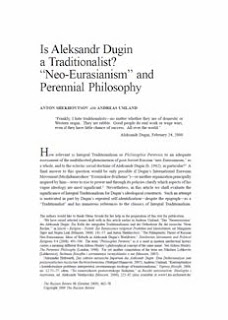
In a new article, Anton Shekhovtsov and Andreas Umland ask whether Alexander Dugin is a Traditionalist, and conclude that he is not--or rather, that he is not an "Integral Traditionalist," a term that they use and he does not. The article, "Is Aleksandr Dugin a Traditionalist? 'Neo-Eurasianism' and Perennial Philosophy" was published in The Russian Review 68 (October 2009), pp. 662–78.
The basic argument is that "Integral Traditionalism" can be defined as Guénon's own Traditionalism, that Evola differs so much from Guénon that he is not really an "Integral Traditionalist," and that Dugin differs from Evola, let alone Guénon, and so cannot possibly be a Traditionalist, even if he says he is.
Whether one accepts this argument or not depends on one's terminology. If by "Integral Traditionalism" one means "Guénonian Traditionalism," then Dugin is clearly not a Traditionalist, and neither are many other people who consider or considered themselves Traditionalists, probably including Schuon. If by "Traditionalism" one means a whole school of thought, in which are found disagreements and developments, then Dugin clearly has an important relationship to Traditionalism, as well as to other schools of thought.
Although they do not put it in quite these terms, Shekhovtsov and Umland question whether Traditionalism so defined (that is, as defined by me and some others, and not as defined by them and some others) is sufficiently coherent to be characterized as a school of thought in the first place. Their view is evidently that, taken together, the difference between Guénon's lack of interest in politics and Evola's interest in politics, the differences concerning initiation, and the difference between Guénon's rejection of modernity and Dugin's approval of some varieties of modernization, produce contradictions too great for one label to have much meaning.
The basic argument is that "Integral Traditionalism" can be defined as Guénon's own Traditionalism, that Evola differs so much from Guénon that he is not really an "Integral Traditionalist," and that Dugin differs from Evola, let alone Guénon, and so cannot possibly be a Traditionalist, even if he says he is.
Whether one accepts this argument or not depends on one's terminology. If by "Integral Traditionalism" one means "Guénonian Traditionalism," then Dugin is clearly not a Traditionalist, and neither are many other people who consider or considered themselves Traditionalists, probably including Schuon. If by "Traditionalism" one means a whole school of thought, in which are found disagreements and developments, then Dugin clearly has an important relationship to Traditionalism, as well as to other schools of thought.
Although they do not put it in quite these terms, Shekhovtsov and Umland question whether Traditionalism so defined (that is, as defined by me and some others, and not as defined by them and some others) is sufficiently coherent to be characterized as a school of thought in the first place. Their view is evidently that, taken together, the difference between Guénon's lack of interest in politics and Evola's interest in politics, the differences concerning initiation, and the difference between Guénon's rejection of modernity and Dugin's approval of some varieties of modernization, produce contradictions too great for one label to have much meaning.
This view certainly has merit, especially with regard to attitudes to politics. With regard to modernity, one might argue that Dugin is simply being more honest than Guénon in recognizing publicly that Traditionalism is not actually traditional--that it is a product of modernity, and in a sense a form of post-modernism. With regard to initiation, one might note that emphasis on initiation was a late addition to Guénon's own work. But surely a movement cannot be apolitical and political at the same time? Or perhaps it can... one can think of other examples of the apolitical being also political. What about Christianity, for example? "Render unto Caesar the things which are Caesar's, and unto God the things that are God's." And yet Christianity has not always been apolitical. Should we argue that many popes and bishops were not really Christian?
I am not totally convinced by Shekhovtsov and Umland's argument, then, even though the article does raise important questions, and their examination of the relationship between the thought of Guénon, Evola, and Dugin is most interesting. Whether or not one allows Dugin the right to call himself a Traditionalist, it is useful to see how he fits in with others who call themselves Traditionalists.
I am not totally convinced by Shekhovtsov and Umland's argument, then, even though the article does raise important questions, and their examination of the relationship between the thought of Guénon, Evola, and Dugin is most interesting. Whether or not one allows Dugin the right to call himself a Traditionalist, it is useful to see how he fits in with others who call themselves Traditionalists.
One last word in what is becoming rather a long post. Shekhovtsov and Umland do me the honor of devoting a section of their article to my work on Traditionalism, and even giving me my own sub-heading. Mostly, they refer to views of mine that support their argument that Dugin differs from Guénon in important ways--which, of course, he does. Sometimes they are complimentary about my Against the Modern World, for which I thank them. They also, however, repeat charges made against me and my work in reviews that, as they recognize, "sometimes seem to be driven by nonacademic motives." Indeed! Which is why I have never responded to them--as a scholar, I welcome scholarly debate, but not mud-slinging.

1 comment:
Dear Mark,
Thank you very much for your comments on our article. And sorry for the delay with my answer.
I have discussed several issues here -
http://anton-shekhovtsov.blogspot.com/2009/11/is-aleksandr-dugin-traditionalist.html
With kind regards,
Anton
Post a Comment